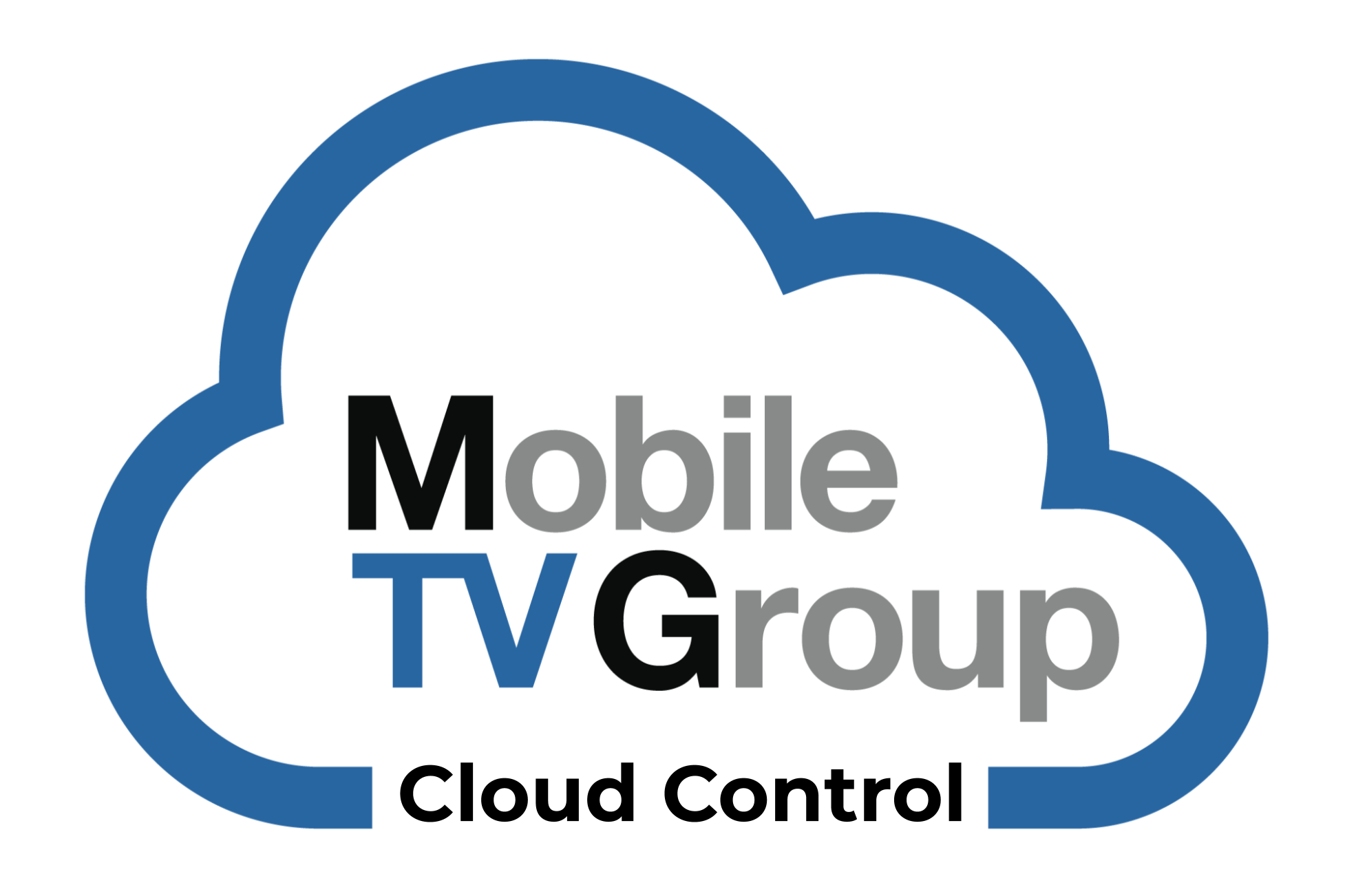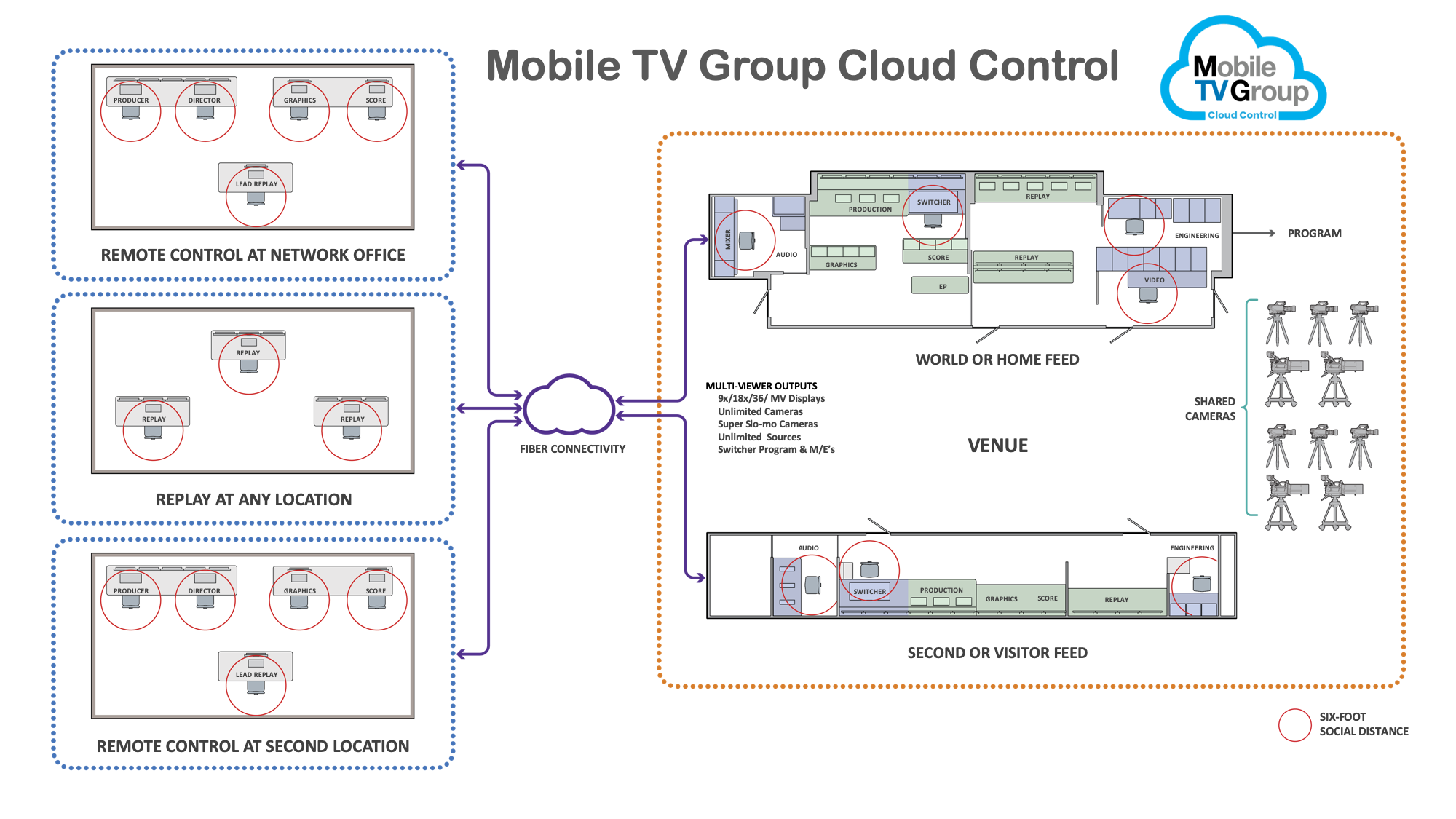Mobile TV Group Takes Remote Production to Next Level With Launch of ‘Cloud Control’
Sinclair/Fox Sports, AT&T SportsNet, and Altitude Sports RSNs have already tested new system
Story Highlights
Mobile TV Group (MTVG) is launching its new Cloud Control live-game-production system – a groundbreaking new remote production workflow that enables production personnel normally in the mobile unit to work at their network offices. Cloud Control unlocks ultra low latency remote control to produce games with unlimited sources and replay (30+ cameras, Super Slo-mo, 4K) and the control room can be assembled in a day for just $20,000.
 “We think this is the ideal system during the Coronavirus outbreak and for the future if the networks want to minimize travel, have fewer personnel in the mobile units, and significantly lower cost, while retaining the production values of the past,” says Mobile TV Group CEO, Philip Garvin. “Furthermore, we want to share Cloud Control with all mobile unit vendors and all networks, so that this new version of ‘at home’ can help assure a safe and efficient return to live production.”
“We think this is the ideal system during the Coronavirus outbreak and for the future if the networks want to minimize travel, have fewer personnel in the mobile units, and significantly lower cost, while retaining the production values of the past,” says Mobile TV Group CEO, Philip Garvin. “Furthermore, we want to share Cloud Control with all mobile unit vendors and all networks, so that this new version of ‘at home’ can help assure a safe and efficient return to live production.”
Cloud Control eliminates personnel travel and solves the challenge of social distancing in the mobile unit without impacting production quality. Furthermore, the crew size can remain the same although working away from the venue. Sinclair/Fox Sports, AT&T SportsNet, and Altitude Sports have tested the new system and are on board to utilize it for game productions once live sports events return.
“This changes the sports broadcasting industry,” says Mike Connelly, EVP, Sinclair/Fox Sports Regional Sports Networks. “This cloud-based technology maintains the quality of live event productions [and] protects our intimate relationship with our team partners with an economical workflow system. In the new social distancing environment, it ensures the safety of our production crews and technicians.”
This new approach involves remoting people and control using only multi-viewers, intercom, and control data, rather than sending camera feeds back. Unlike previous “at-home” systems which limit the number of cameras and replay, require multi-million dollar control rooms at the broadcast center, and require more bandwidth, Cloud Control can be achieved in a standard office space with a 250-500 Mbps circuit to the mobile unit at the venue. MTVG provides networks a list of required equipment (a one-time cost of approximately $20,000 plus $10,000 for each EVS operator position) or MTVG will install it on a lease/rental basis (mobile units must be Cloud-Control-compatible).
RSN Production Teams: Cloud Control System Is ‘Like Being in the Mobile Unit’
In anticipation of the return of MLB, NBA, and NHL, MTVG conducted tests during the week of May 11 with Sinclair Broadcast Group/Fox Sports North, Altitude Sports, and AT&T SportsNet Rocky Mountain. Producers and directors described Cloud Control “like being in the mobile unit” but working from their network offices. The production had immediate control and use of all facilities in the mobile unit including unlimited cameras, EVS replay, super slomo, graphics, score-box, intercom and audio. All with negligible latency (well under 100 Milliseconds).
“This system allows us to remotely replicate our dual feed model that we have spent so many years perfecting,” says Ken Miller, GM & Executive Producer, Altitude Sports. “It’s so important for us to be able to Produce our own teams’ storylines for our fans and also satisfy our sponsors. This system allows us the independence to do just that.”
Erica Ferrero, Senior Director, AT&T SportsNet Rocky Mountain adds: “Accessing truck assets from our home studio with minimal latency allows us multiple ways to approach a broadcast.”
Cloud Control can be used to produce multiple feeds of live games – including World Feeds, Home shows, and Visitor shows – all with just three to four personnel per feed in the mobile units. Using Mobile TV Group’s dual feed mobile units (an A and B unit), up to three feeds are possible without additional mobile unit footprint.
“What’s really new technologically isn’t so much the use of remote control for individual devices, it’s the orchestration of the entire production, from network offices or anywhere.” – Nick Garvin, COO, Mobile TV Group
Inside the Cloud Control Test
Mobile TV Group has been developing Cloud Control for over two years, culminating in the test during the week of May 11 . For this test, one of its mobile units was set up at Denver’s NHL/NBA venue, Pepsi Center. Although no games were underway, several cameras and camera operators were deployed.
Inside the mobile unit there were only four personnel: the T.D., an A1, a Video shader, and an engineer. Producers and directors were located at the offices of Fox/Sinclair Sports North (Minneapolis), Altitude (Colorado), and AT&T SportsNet Rocky Mountain (Colorado). In each office, they were seated in front of four large 55+-inch monitors each with multi-viewers with up to 18 images (the selection, size and positioning of which they could determine). They each had full intercom panels (RTS KP-5032) which gave the producers and directors the exact same communication that they would have in the mobile unit. Effectively it was just like being in the mobile unit except that they could be up to 3,000 miles from their TD and A1.
The EVS operators (using a regular EVS controller, router control, and X-file control) could be in the same office or in another location. In the test the EVS operator was at the Altitude offices serving all three networks. Graphics and score box operators could be at any office.
In addition to distributed personnel, Cloud Control enables distributed hardware, which can utilize a combination of point-to-point systems, on-site hardware, public cloud (AWS/Google in Cloud) and MTVG’s private cloud. This hybrid approach to hardware gives users access and control to the high-end technology that may not have otherwise been available in a traditional on-site production.
Stay tuned to sportsvideo.org for more coverage of this story in the coming days.

